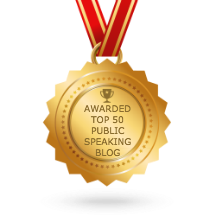This week, I coached a Director at a Fortune 100 company who is preparing to deliver an executive summary presentation. Twice a year, “Steve” must present to senior executives an update that includes what his team has achieved, what they are working on, what their prospects are and what they have contributed to the overall company.
Steve is a smart guy, on the introverted side, and aware that this presentation is not just an update but an opportunity to justify his personal efforts, his salary and his position. So, after our first coaching session, he wrote a succinct and sizzling introduction to his 15 minute presentation. In our second session, he was ready to refine and polish his intro. His intro was really good; and we could have left it alone. But, because we were going for great, I listened for flow of speech that allowed his executive audience to follow his thought process without any mental snags.
A thought snag is a word, phrase or idea in a speech that causes listeners to question what you mean. When listeners get mentally snagged on something you say, they stop listening and tracking with you. When a presentation is critical, you don’t want your listeners to get stuck on anything you say. You don’t want listeners to be thinking, “What did he mean?” You don’t want to say anything that causes them to stop following the meaning of your words.
In the last phase of coaching a client’s presentation preparation, I simply listen to hear if I follow and understand everything being said. And I especially listen for anything that makes me stop listening. Anything said that stops me from tracking, we rewrite on the spot until it flows.
Here are a few ideas for writing talks that don’t cause thought snags in your listeners.
- Speak in the simplest language possible.
- Keep sentences short
- Don’t use compound sentences.
- Make sure your grammar is correct.
- Use active, not passive tense. ie. “We will do it.” not “It will be done.”
If you are facing a very important presentation where much is at stake, I suggest that you read your talk aloud to someone who is not involved and has no stake in the situation. Ask a friend to listen for anything you say that makes them stop listening or start questioning what you meant. Then, rewrite until there are no thought snags in your talk.
Those of you who have worked with me or read many of my posts, know that my emphasis is not on giving the “perfect” speech. Rather I focus on authentic speaking. However, when a presentation is critical to your career, taking the extra time to make it flow is worth the effort.




